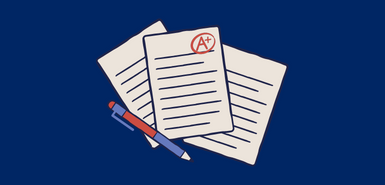2. Read each question slowly and carefully. It is very easy to misread the question because you are in a panic and in a rush. If you have the option of choosing which questions you answer, make sure that you read all of the questions thoroughly before asking yourself, "Which questions could I answer best?" If possible, start by tackling the question you feel the most confident answering.
3. It is important to study the question very carefully. Underline key words. Look very closely at the verbs. Make sure you understand what the question is asking you to do. Are they asking you to compare, compare and contrast, discuss, analyse, etc?
4. Look at any numbers mentioned. Are you asked to give a minimum or maximum number of examples in your answer? Also check to see if a word limit is specified. It is also worth looking at the number of marks allocated to each question. The length of your answer should be proportional to the number of total marks it is possible to achieve. So, for example, if the maximum marks for an answer is 2 points then your answer should be shorter than for another question where the total number of marks is 10 points.
5. Check what form of writing your answer should take. Ask yourself, "Have I been asked to write an essay, a report, a letter etc?" Make sure your answer is written in the correct format for the task.
6. Does the question indicate if your language needs to be formal or informal? Make sure your writing is the correct register for the question and for the intended audience or reader.
7. Write a quick plan. It is tempting to just start writing your answer immediately but it is vital that you plan your writing so that you actually answer the question properly and fully. Use short bullet points to summarise what each part of your answer will include.
8. Now look at your plan and compare it to the question. Ask yourself the following question: "Does this plan flow logically?" If you are writing an essay, check that your plan includes:
a) An introduction outlining your position or what the essay will discuss etc.
b) A clearly defined series of points.
c) Points that are systematically organised.
d) Good evidence to support each point you are making.
e) A strong conclusion summarising your argument.
If you are answering another type of exam question, check that you have chosen the correct format and structure for the task. A report must follow the conventions of a report. A letter must have the correct salutations etc.
Finally, ask yourself, "Would my answer meet all of the criteria given in the question?" If it does then start writing! If not, revise your plan.
9. Write your answer! Make sure that you use linking words correctly so that your writing flows well. Be aware of time management! It is crucial that you aim to finish at least 5 minutes before the time the exam will finish.
10. Use the remaining 5 minutes of the exam time to read through each of your answers slowly and carefully. Check really carefully for spelling, grammar and punctuation errors. Make sure you correct any mistakes! Check that you have answered each question completely and that you have not left anything out! Make sure that you have written the correct number of words.

Comments
Post a Comment